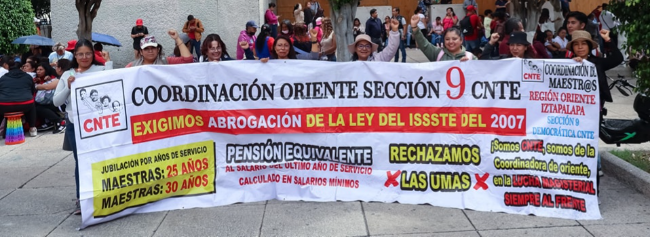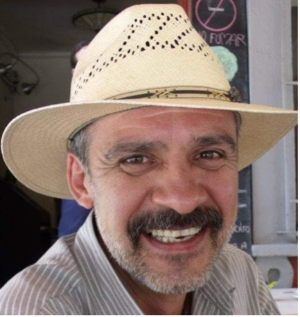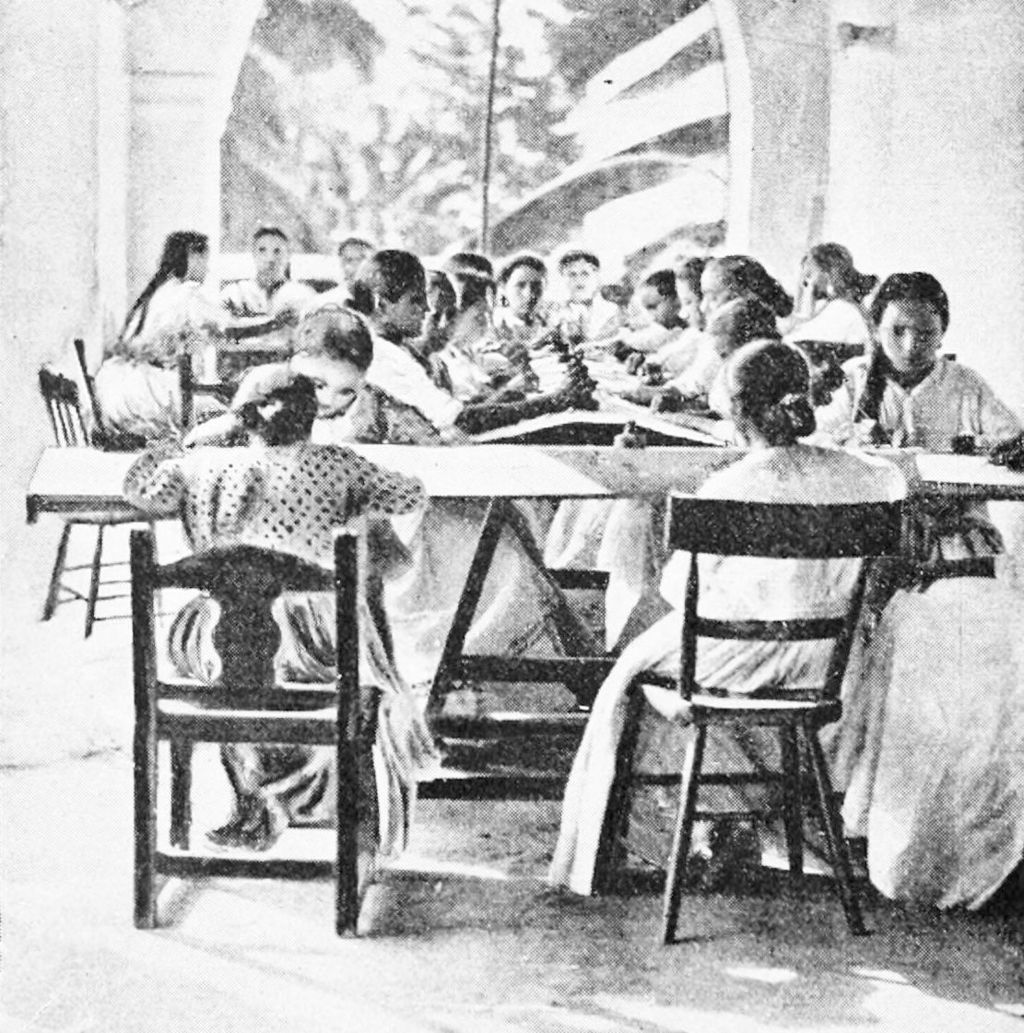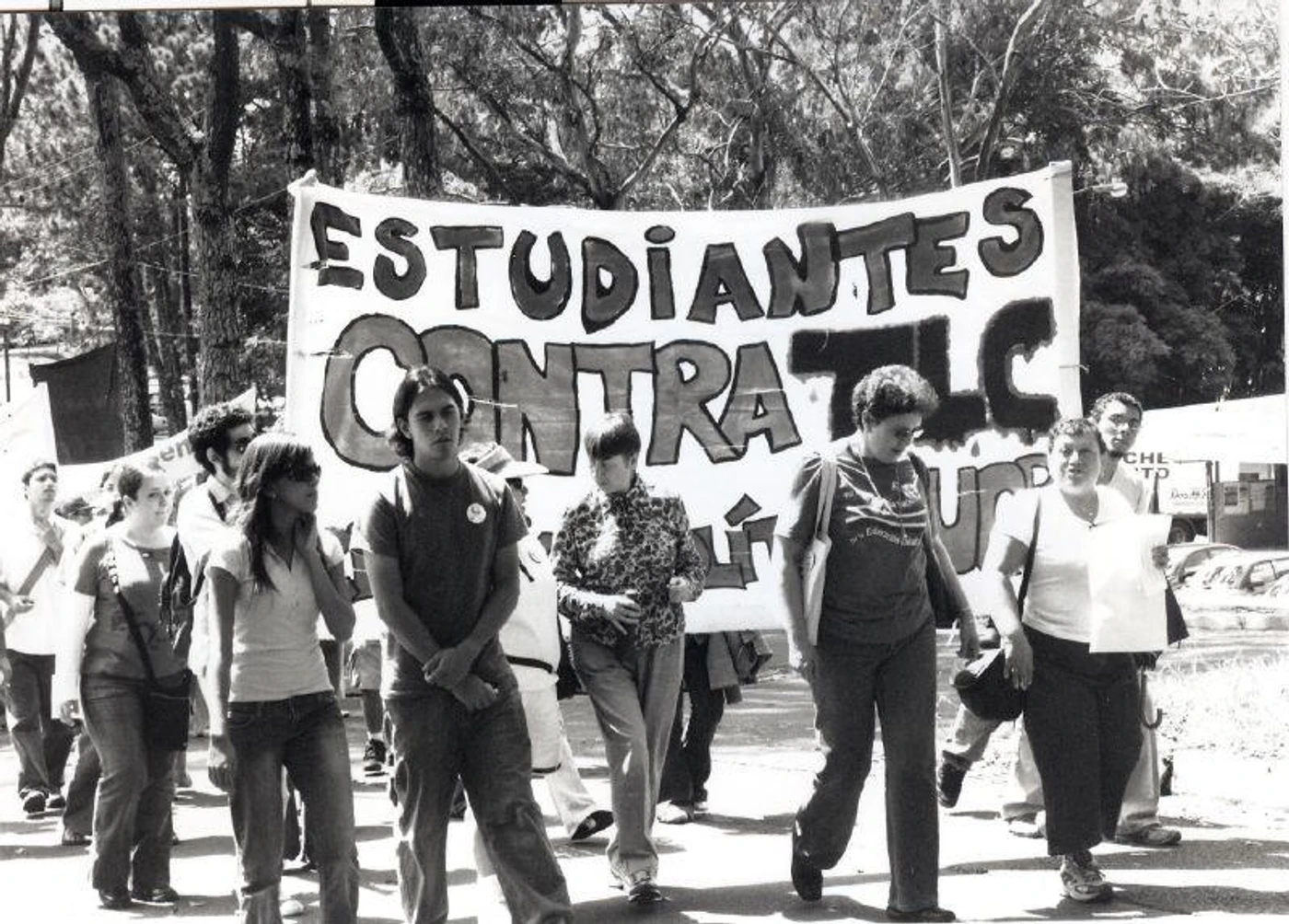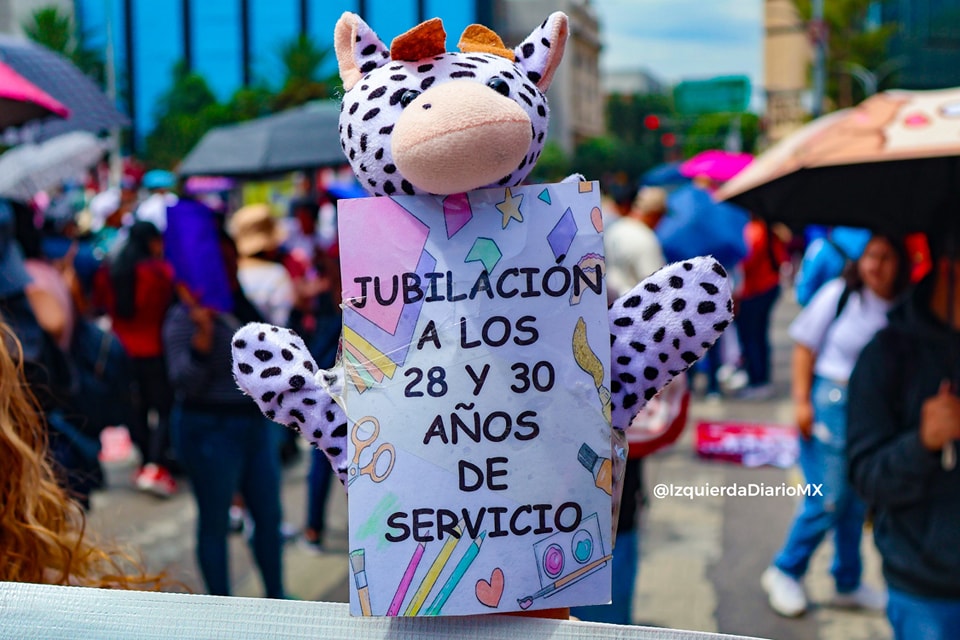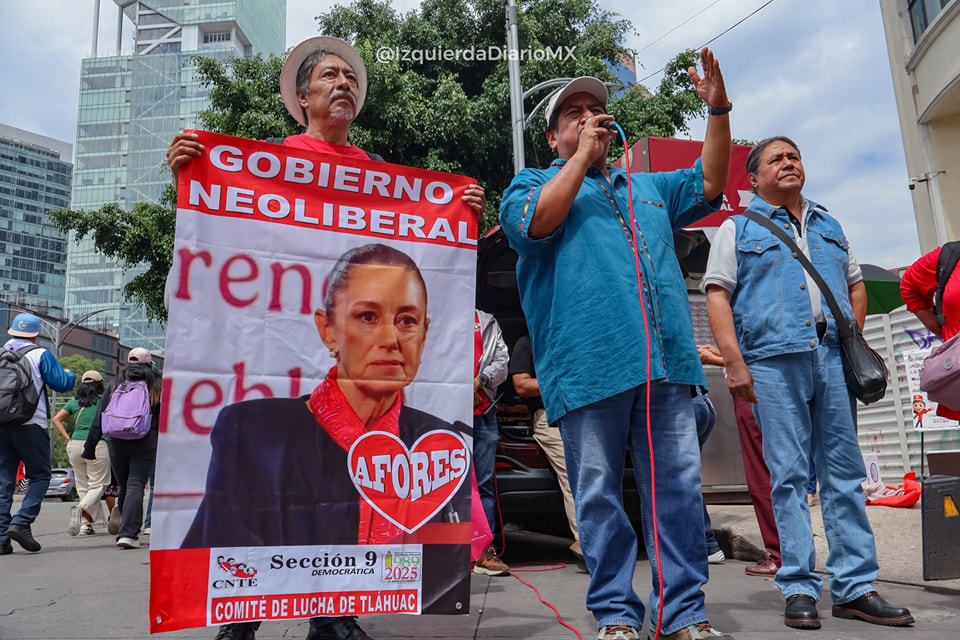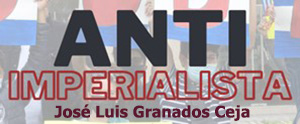|
|
The weekly newsletter of the Mexico Solidarity Project |
|
Every issue archived online at mexicosolidarityproject.org/archives/ |
|
June 11, 2025 |
|
|
|
Teacher Appreciation Day — In the Streets |
|
Meizhu Lui, for the editorial team |
|
|
Day 14 of the teacher's strike. Photo: La Izquierda Diario |
|
Mexico’s relationship with its teachers is special, dating back to before the Mexican Revolution. Mexico was then mostly rural, and teachers were among the few who could read and write. Along with priests, they were the most respected members of their communities, often consulted when problems arose. They even acted as advisors to secular and military leaders.
As Mexico City teacher Ángel Custodio tells us, teachers greatly influenced the 1917 constitution. Because they spent so much time with students and their families, they knew intimately that beyond reading, writing and arithmetic, the Mexican people needed rights and protections to secure their basic needs. With this perspective, they injected a social justice agenda into the constitution. In appreciation, on May 15, 1918, the first annual Teachers Day was organized.
But you can’t eat appreciation! Today, from their low pay and benefits, you’d never imagine the vital role teachers have played in Mexican communities. This year on Teachers Day, the CNTE, the militant pro-democratic caucus within the conservative SNTE, marched in the streets — and turned celebration into a demonstration, which is still ongoing.
The current CNTE demands are no less than the cutting edge of progressive efforts to dismantle the neoliberal rules that privatized social goods — in this case, public worker pensions. Teachers are demanding a return to the socialized pension system, which guaranteed stable and predictable retirement income based on a worker’s salary. They want the pension money taken out of the hands of private money managers, who can’t lose money themselves when they gamble with the worker’s dollars.
Yes, the Morena government has done a lot to reverse privatization, for example in the energy sector. But it’s time to work with the teachers to renationalize the pension system, and ensure educators get to enjoy the secure old age that they so richly deserve. |
|
|
Is Claudia with the Teachers or the Banks? |
|
Ángel Custodio Guadarrama has been a research professor at Mexico City’s Institute of Higher Secondary Education since 2009. He is currently a member of the Mexican section of the Trinational Coalition in Defense of Public Education, where, in conjunction with teacher unions and movement organizations, he develops policies to prevent the privatization of public education services. He has a long history of union and social protest and is a member of the IEMA Workers’ Union (representing Mexico City preparatory schools), where he teaches history. |
|
|
The role of teachers in Mexico’s history is unique, isn’t it? |
|
Teachers have a foundational role in Mexican history and were directly involved in the formation of the Mexican state. Many were anarcho-syndicalists and socialists; the fact that social issues and worker rights were included in the 1917 Mexican Constitution is thanks to the teachers who helped write it.
The people have always had extreme respect for teachers, and the importance of education is embedded in that Constitution. Free public education from preschool through college was guaranteed to children and youth. |
|
|
School of Mestiza girls at Hoctún, courtesy of Alice Dixon Le Plongeon, Popular Science Monthly, 1893-1894: Public Domain |
|
Did the teachers’ union carry on that progressive legacy?
In the 1930s, progressive president Lázaro Cárdenas brought all sectors of society, including labor, under the wing of the governing PRI party; labor leaders were appointed, not elected. Teachers were placed in the National Union of Education Workers, or SNTE. It’s the largest union in Latin America, with over 1.4 million members.
Like most unions in Mexico, the SNTE operated as a state instrument. Its leaders exerted control over the teachers rather than fighting for them. Teachers who wanted a worker-run union responded in 1979 by forming the National Coordination of Education Workers, the CNTE, as a dissident caucus within the SNTE. The CNTE’s strongholds are in the states of Michoacán, Guerrero, Chiapas, Veracruz, and particularly Oaxaca, but it has gained significant strength in Baja California and Zacatecas.
Almost yearly, the CNTE has mounted campaigns to improve the lives of teachers and the communities they work in — militant campaigns including strikes, demonstrations and blocking highways — and has been met with extreme repression. Numbers of teachers lost their lives or were disappeared when the police and the military broke up their actions. That said, their confrontational tactics have produced most of the teachers’ gains. |
|
A shift in education came with the advent of neoliberal economics. What were the proposed changes and the results?
Neoliberal “reforms” started even before NAFTA. That is, the idea that private enterprise could provide better services and provide them more efficiently than the public sector evolved into the dominant consensus. |
|
In the 1980s, Mexico moved to end free education in public colleges. I was part of the huge student movement that rose up in protest. We defeated that attempt. When NAFTA passed in 1994, the government proposed to end free university education again. Students rose up and defeated that effort too! |
|
|
Anti-NAFTA demo: courtesy The Guardian |
|
But after that, US-style neoliberalism became the order of the day, and public sector workers’ rights and benefits were eroded. In 2007, the pension system under the ISSSTE, the government department responsible for social security and social services for government employees, was converted from a solidarity-based system to individual retirement accounts. In the solidarity system, workers and government funded a large pool, and every worker could count on getting a defined percentage of their current pay. In the new system, based on private investment schemes, it’s possible that some retirees receive only about 30% of their usual pay, not a living wage.
Currently, the size of the public sector pension fund is massive. Yesterday, Professor Pedro Hernández, a CNTE general secretary, reported that workers' savings deposited in the AFOREs accounts, or Income Savings Funds, total 8.2 trillion pesos, equivalent to just over US $420 billion! AFOREs, private companies that manage the individual accounts, invest that money and earn large profits for finance capital.
In President Peña-Nieto’s 2012-2018 term, teachers’ job security and the quality of education faced their biggest threat. He proposed that teachers keep their jobs or be fired based on how they performed on standardized tests. As if the test questions represented all the necessary competencies of a teacher! CNTE’s biggest victory was the defeat of those proposals.
On March 15, CNTE demonstrated in Mexico City’s Zócalo demanding an immediate improvement in their wages and retirement benefits. Has President Sheinbaum supported them? |
|
First, the teachers don’t believe President Sheinbaum appreciates their worth. She’s offered a 9% raise with 1% more in September, but they demand 100%. Inflation has severely reduced the purchasing power of their wages. They’ve been underpaid for years and want to catch up. |
|
|
Day 14 of the teacher's strike. Photo: La Izquierda Diario |
|
Second, when she ran for president, Sheinbaum promised she would repeal the 2007 changes to the ISSSTE, but now in office, she so far hasn’t agreed to do that. Nor has she agreed to take the pension funds out of the private banks. Hence, the slogan, “Are you with the teachers or with the banks?” Her one concession was not to raise the retirement age, as she had originally proposed.
All the teachers’ demands are justified. Moreover, repeal of the ISSSTE would not just benefit all public sector workers but also all workers. Taking pension money from private banks and depositing it in the public bank would build a strong public banking sector, providing better services to ordinary people, not just the wealthy. |
|
The CNTE doesn’t seem to have the mass support it has had in its past militant actions. Is that true?
In this contract struggle, the CNTE shut down the airport, blocked journalists from attending a Sheinbaum mañanera, and more — and the tactics have created some backlash. Also, the CNTE nucleus that determines their tactics is from the Oaxaca chapter; many other states participate, but without fully supporting them. For example, the leader of the CNTE’s Michoacán chapter is in Mexico City, but she hasn’t called for other members to join her. She’s encouraging them to negotiate with their local officials, as Sheinbaum has also suggested. |
|
|
Day 14 of the teacher's strike. Photo: La Izquierda Diario |
|
CNTE’s problem is that many who took to the streets against President Peña-Nieto before 2018 are now with AMLO and Sheinbaum. In addition, AMLO instituted the New Mexican School model, a teaching methodology based on traditional Indigenous practices. |
|
Rather than teaching success for individuals, they teach competencies that promote the collective good. This reform also undercut support for the CNTE’s actions. The teachers encamped in the Zócalo don’t currently represent the majority of teachers. |
|
In parallel to the CNTE's struggle, my own union, the SUTIEMS, which represents teachers in the High School Education Institute of Mexico City, began striking on Thursday, June 5. We demand a 30% salary increase, plus hiring sufficient administrative and teaching staff to properly serve our students. |
|
|
Union of Workers of the Institute of Higher Secondary Education, 2024 |
|
Mayor Clara Brugada Molina has offered the 1,800 education workers a mere 3.5%, while offering the 80,000-member police force 9%!
The teachers’ demands are legitimate, and they challenge bourgeois ideas and their profits. The question is not “if” they should challenge them, but “how!” Many support their demands, but not their tactics. I and many other educators are involved in discussions about the “how.” We think that teachers can and must play a role as a respected constituency, as they did in 1917, when their beliefs shaped a progressive Constitution. |
|
|
|
|
Ideological Custodians of a Dying Neoliberalism |
|
|
Mexico City based freelance writer and photojournalist José Luis Granados Ceja previously spent time as a staff writer for teleSUR, and currently works with Venezuelanalysis. His writing on contemporary Latin American democratic struggles can be followed on X (Twitter): @GranadosCeja. |
|
|
A political movement that is serious about transforming the material conditions of the working class understands that it must dismantle the obstacles placed along its path.
Mexico's old judiciary was one such obstacle. Hiding behind a mask of sham impartiality, the old judiciary was one of the few remaining conservative strongholds left in the country.
These ideological foes of the Fourth Transformation conspired and collaborated from behind the bench in a desperate effort to slow the old regime’s demise.
On June 1, Mexicans elected its new judiciary. The people voted for the country’s judges, magistrates and Supreme Court justices, making Mexico the first country in the world to elect its entire judicial branch. The neoliberal regime’s defenders have now lost the executive, legislative and judicial branches.
But these conservatives won’t desist. Within Mexico, some segments of civil society have responded predictably, with pundits like Héctor Aguilar Camín, Enrique Krauze and Denise Dresser decrying the so-called death of Mexico’s democracy, the latter even trying to employ fad terminology like “competitive authoritarianism” in a futile effort to give her discredited worldview some credibility.
In the international arena, the Organization of American States, or OAS, which sent an electoral mission to Mexico for the vote, appears content to continue advocating for conservative interests. The new OAS Secretary General as of May 26, Albert Ramchand Ramdin, arrived at his post with the expectation that his leadership would move away from the controversies and flagrant interference in the internal affairs of member states at the behest of Washington.
Ramdin now faces a crucial early test of that vision after the Mission’s Preliminary Report cast aspersions on the election of the judiciary.
Using diplomatic but quite firm language, the Mexican government formally protested the OAS' inappropriate behaviour, charging that it “exceeded its mandate and engaged in actions contrary to the principles of the OAS Charter.”
In the “Final Considerations” segment of the report, the Mission clearly supported the views of the conservative opposition and punditry. Tellingly, they went so far as to state that “the Mission does not recommend that this model of selecting judges be replicated for other countries in the region.”
Meanwhile, voices like Argentina’s Cristina Fernández de Kirchner (a victim of lawfare herself) is already pointing to Mexico’s example. That the OAS Mission would try to scare other countries from following Mexico's lead shows how scared they are at the notion.
Mexico correctly views that countries have the sovereign right to decide how to reform their political system, including the selection or election of the judiciary, and that the OAS Mission does not have the “authority to issue value judgments that exceed its powers.”
Figures such as Dresser or organizations such as the OAS are ideological custodians of a dying neoliberalism, desperately striving to deny the people’s sovereign right to decide their own political and economic system. They only reveal their own irrelevance when they insist on a world view being rapidly left behind. OAS Secretary General Ramdin should use this opportunity to mark a break from his predecessor’s regular flouting of the OAS Charter and place some distance from the Mission’s inappropriate recommendations. In any case, Mexicans will continue dismantling any and all obstacles, barriers, and strongholds that stand in the way of well-being for the people. |
|
|
|
Recent news reports and commentaries, from progressive and mainstream media, |
|
Trump Militarizes California Amid Immigration Raids, Threatens Arrests of Local Officials Telesur English. Trump militarizes California without state consent and threatens to arrest local leaders, while Mexico and international organizations condemn the criminalization of migration and democratic backsliding in the U.S.
Rubén Martín, Las demandas de la CNTE y su lucha legítima Sin Embargo. Contrario a lo que se difunde de ellos, los maestros de la CNTE son una de las organizaciones de trabajadores más preparadas y democráticas del país.
Mexico Criticizes OAS Report on Judicial Elections and Defends Its Sovereignty Telesur English. The Mexican government stressed that an OAS observation mission “does not have the power to try to impose its own criteria on how countries, in the use of their sovereignty, should form their judicial branch. Even less so, to issue value judgments that exceed its powers.”
Conmina COLEFOM al Estado mexicano a condenar violencia contra migrantes en EU La Jornada. El Colectivo de Federaciones y Organizaciones Mexicanas Migrantes en EUA, lanzó un llamado a la presidenta, Claudia Sheinbaum, al titular de Relaciones Exteriores, así como al embajador de México en Estados Unidos,y al Poder Legislativo, para que condenen los actos de violencia, racismo y xenofobía en contra de la comunidad migrante mexicana, ocurridos durante el fin de semana en Los Ángeles por parte de agentes del ICE de los Estados Unidos.
Patrick J. McDonnell and Kate Linthicum, No Supreme Court win, but Mexico pressures U.S. on southbound guns Los Angeles Times. Mexico had filed a $10-billion suit in U.S. federal court seeking to have Smith & Wesson and other gun manufacturers held accountable for the county’s epidemic of shooting deaths.
Explotación laboral de personas campesinas migrantes en invernaderos de Canadá DGCS UNAM. En Canadá hay invernaderos altamente tecnificados y productivos para cultivar frutas, verduras, flores y recientemente cannabis; pero no se sostienen sin la mano de obra de personas provenientes de países en desarrollo, quienes llegan en busca de mejores condiciones económicas.
Howard Fischer, Mexico refusing to drop lawsuit against Arizona gun dealers after U.S. Supreme Court ruling Daily Independent. The Arizona lawsuit, by contrast to the lawsuit against gun manufacturers, actually cites specific sales made by each specific weapons dealer that the Mexican government says eventually wound up in Mexico
Dulce Olvera, Los dueños de las Afores Sin Embargo. Slim, Salinas, los Baillères... concentran fondos de retiro que maestros piden acabar.
Catherin López, Mexico analyses the U.S.'s campaign against international students Radio Habana Cuba. Although Mexico is a sovereign, independent country and does not subordinate itself, as the President reiterates, the degree of relationship with the Northern neighbor implies destabilizing effects, such as the possible halt of visas to students or at least their delay.
Jorge Vaquero Simancas, La salomónica obra para sacar a la superficie los ríos entubados de Ciudad de México: cambiar los coches por el agua El País. El creador del proyecto expone el gran beneficio medioambiental que supone emerger los cauces antaño enterrados, pero se necesitan recursos y voluntad política. |
|
|
|
|
The Mexico Solidarity Project brings together activists from various socialist and left organizations and individuals committed to worker and global justice. We see the 2018 election of Andrés Manuel López Obrador as president of Mexico as a watershed moment. AMLO and his progressive Morena party aim to end generations of corruption, impoverishment, and subservience to US interests. Our Project supports not just Morena, but all Mexicans struggling for basic rights, and opposes US efforts to undermine organizing and Mexico’s national sovereignty.
Editorial committee: Meizhu Lui, Bruce Hobson, Agatha Hinman, Victoria Hamlin, Courtney Childs, Pedro Gellert. To give feedback or get involved yourself, please email us! |
|
Subscribe! Get the Mexico Solidarity Bulletin in your email box every week. |
|
Web page and application support for the Mexico Solidarity Project from NOVA Web Development, a democratically run, worker-owned and operated cooperative focused on developing free software tools for progressive organizations. |

